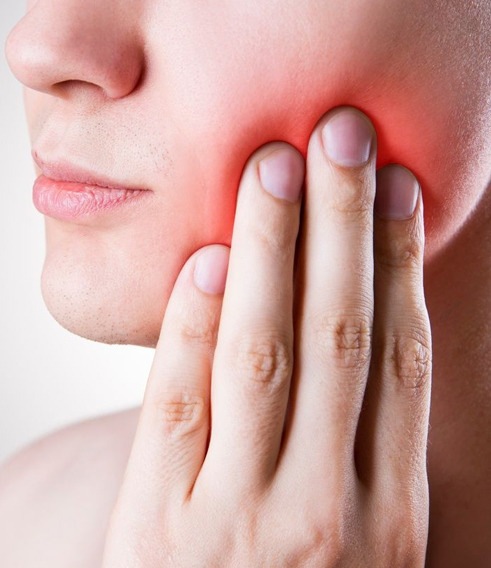 Tooth Care
Tooth CareMultispeciality Dental Clinic
 Tooth Care
Tooth Care +91 9464895055, +91 9986606650 Click for Call
+91 9464895055, +91 9986606650 Click for Call # 219 sector 10, Panchkula, Haryana 134109 Click for Map DirectionBranch-1 (Panchkula)
#219 SECTOR 10, Panchkula, Opposite Sector 11 Main Showroom.
# 219 sector 10, Panchkula, Haryana 134109 Click for Map DirectionBranch-1 (Panchkula)
#219 SECTOR 10, Panchkula, Opposite Sector 11 Main Showroom.
 akhilg321@yahoo.com
akhilg321@yahoo.com

Blood in your sink after you brushing your teeth can be the most common indication of gum diseases. Bleeding, redness, and painful gums can be a symptom of gingivitis (a biological term for diseased gums) that arises due to a number of different causes. . Most commonly, gingivitis is the result of deposits (plaque) build up on the teeth around the gum line. Without adequate removal, the plaque hardens to become tartar, which worsens gingivitis and over time, lead to receding gums. Bleeding gums are the most often symptom of gum disease. But it can also point to other health problems.
Periodontal disease (periodontitis) can occur when gingivitis becomes advanced. Periodontal disease is as infection of the gums, jawbone, and supportive tissues that connect your teeth and gums. Periodontitis can cause your teeth to loosen or fall out.
The dentist who is specialized in gums is called as Periodontist. At Tooth Care Dental Clinic we provide you the best periodontist who can guide yoy how to keep your gums healthy. Also our dentist teach you proper brushing methods so that you don’t abrade your gums. Here in this article, we’ll explain the common causes of bleeding gums, what you can do to stop the bleeding, and when you should see the dentist.
Normally the colour of gums should be coral pink not red. If the colour of gums is becoming red then it might be indication of some gum diseases or some other systemic condition.They should make a collar around the neck of the tooth.
Though they are a tiny part of your body, gums have a big job. They protect the neck and roots of your teeth from bacteria. They guard our teeth from all injuries. Over time, if we don’t take care for teeth, the tissues become too damaged to hold your teeth, leading to loose teeth.
Gums usually bleed becomes something irritates them. Here are common reasons gums get irritated:
If we do not maintain oral hygiene regularly , it will lead to build up of plaque which will act as house of bacteria which further leads to inflammation of gums hence ultimately it will cause bleeding in gums.
As bacteria grow, they irritate your gums, causing gingivitis. Gingivitis is the early stage of gum disease, and its most common symptom is bleeding gums. sometimes, if gingivitis gets worse, your gums may start to pull away from your teeth, leaving space for bacteria to travel into tissues below your teeth which might lead to destruction of bones which is called as periodontitis. The longer bacteria live in your tissues, it will worse your dental health.
During prganancy there are lot of hormonal changes occurs in female body. This change affect gums also. Hormone changes can cause “pregnancy gingivitis.” In this condition gums may swell up and become sensitive, causing bleeding when you brush or floss. So you should consult your dentist how to take care for gums during pregnancy.
There are few medicines which may increase the risk of bleeding gums. Blood thinners and aspirin keep your blood from clotting. These medicines especially increase your risk of bleeding gums and may cause your gums to bleed for a long time after brushing.
You should inform your dentist if you are taking these medicines.
Keep in mind that brushing too hard can also irritate your gums and cause them to bleed. Always use a gentle motion when brushing and consider getting a brush with soft bristles.
Vitamins C and K deficiencies can also cause gums to bleed easily. Ask your doctor to check your levels of vitamins C and K if you have bleeding gums that aren’t caused by improper dental care. Follow a diet that contains both nutrients to ensure you’re getting the vitamins you need to stay healthy
Some chronic conditions that affect the function of the immune system, such as HIV infection or diabetes, may also have an increased tendency to develop gingivitis.
Good oral hygiene is the first step to managing bleeding gums. Visit your dentist twice per year for scaling (cleaning). Your dentist will advise you how to take care for your oral health and teach you how to brush your teeth properly. Proper brushing and flossing can remove plaque from your gum and reduce your risk of developing gum disease.
You can also try antiseptic mouthwash to minimize plaque formation in your mouth. And a rinse of warm salt water can help soothe swollen gums that bleed easily.
It’ll be gentle on inflamed gums, especially if you experience bleeding after brushing your teeth. Medium and hard bristles may be too abrasive for your delicate gums.
Schedule an appointment with your general physician to determine if dental health is not the underlying issue causing your bleeding gums. Because treatment depends on cause of the condition.
Tobacco products, including cigarettes and chewing tobacco, badly affect your gums. Tobacco destroys your teeth and gums, leading to tooth decay and loss of teeth.
The foods you eat impact the health of your mouth. Sugars and starches provide food for bacteria, helping them grow. Eating throughout the day also can increase the amount of bacteria in your mouth. Make sure your diet should be rich in vitamin c and k which is beneficial for gums.
© Copyright 2024, All Rights Reserved | Tooth Care Dental Clinic.